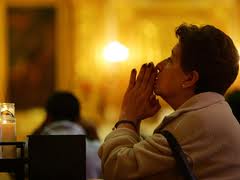During a recent Mass, my 3-year-old son tugged at my sleeve and said, “Daddy, look, grandma is crying.” He refers to older women as “grandma,” older men as “grandpa,” and older children as “big brother” or “big sister.” He’s too young to ask why she was crying, but it made me wonder, and as I prayed for her, I thought about the emotions people experience at Mass. I began to wonder— Why don’t people cry during Mass?
Some might cry during Mass for deeply personal reasons. Perhaps they’ve recently lost a loved one, are struggling with personal hardships, or feel overwhelmed by emotion. During the consecration of the Eucharist, in particular, many feel a profound connection to Christ’s suffering. As they reflect on His ultimate sacrifice, they may be moved to tears, humbled by the weight of His love and the brutal death He endured for all of us.
But it’s not every day that you see someone crying during Mass. Why is that? What keeps people from experiencing these emotions more frequently?
Distractions from the Solemnity of Mass
Part of the answer might lie in how we approach Mass. People unknowingly engage in behaviors that detract from its sacredness. These distractions prevent us from fully connecting with the deeper spiritual realities present during the Mass.
Here are some common behaviors that can diminish the reverence we should bring to Mass:
1. The Orans Posture During the Our Father
The Orans posture—raising one’s hands while praying—is traditionally reserved for the priest. Congregants imitating this gesture can blur the lines between the roles of the clergy and laity, which may distract from the prayer’s solemnity.
2. Excessive Time During the Sign of Peace
The Sign of Peace is a beautiful gesture meant to share Christ’s peace, but when prolonged, it can shift the focus away from the sacredness of the Mass and become more about socializing.
3. Clapping During the Liturgy
While well-intentioned, applause—especially after a sermon or choir performance—turns the focus from worshipping God to human achievement, which takes away from the reverence of the Mass as a divine celebration.
4. Excessive Socializing Before and After Mass
Building community is important, but excessive talking in the church can reduce the sense of holy reverence that should be present in the sacred space.
5. Not Fasting Before Receiving the Eucharist
Catholics are called to fast for at least one hour before receiving Communion as a spiritual preparation for receiving Christ. Failing to fast can reduce the sense of reverence for the Eucharist.
6. Cell Phone Use
Even discreet cell phone use can pull us away from the prayerful atmosphere, disrupting the focus on the Mass.
7. Holding Hands During the Our Father
While holding hands can symbolize unity, it can sometimes become a distraction, focusing more on those around us than on the prayer and our connection with God.
8. Overuse of Extraordinary Ministers of Holy Communion
While these ministers assist in distributing Communion, overuse may diminish the unique role of the priest in consecrating and administering the Eucharist.
9. Ushers Talking During Communion
The reception of the Eucharist is the most sacred moment of the Mass. When ushers talk to people in line, it disrupts the reverence and solemnity of this profound encounter with Christ.
Understanding the Early Christian Roots of the Mass
To fully grasp why we should strive for reverence during the Mass, it helps to remember its origins. In the earliest days of Christianity, followers of Christ gathered for the “breaking of the bread” (Acts 2:42) in small, intimate settings. This wasn’t just a meal; it was a deeply spiritual act, where they participated in the mystery of Christ’s sacrifice.
The Catholic Mass continues this tradition. It’s more than just a gathering of people—Catholics believe in the Real Presence of Jesus in the Eucharist. During the consecration, bread and wine truly become the Body and Blood of Christ, making the Mass a sacred event where heaven and earth meet. This is fundamentally different from many Protestant services, which tend to focus on community worship and do not have the Real Presence of Jesus in the Eucharist. Protestant services often emphasize fellowship, prayer, and a sermon but lack the sacrificial nature of the Mass.
In this light, the distractions that occur during Mass take on even more significance. They pull us away from the profound mystery we’re participating in—Christ’s sacrifice—and prevent us from experiencing the deep emotions that might otherwise surface, including tears of reverence, gratitude, or sorrow.
Why We Should Strive for Reverence
 If we approach the Mass with proper focus and reverence, it becomes easier to open ourselves emotionally to the experience. When we strip away the distractions and give ourselves fully to the mystery and sacrifice being celebrated, we may find that we, too, are moved to tears.
If we approach the Mass with proper focus and reverence, it becomes easier to open ourselves emotionally to the experience. When we strip away the distractions and give ourselves fully to the mystery and sacrifice being celebrated, we may find that we, too, are moved to tears.
The Mass is not just a communal gathering or an opportunity for social interaction—it is a sacred event where we encounter Christ Himself in the Eucharist. By maintaining reverence and focusing on the true purpose of the Mass, we can open our hearts to the awe and humility of being in His presence. With that focus, we might find ourselves overwhelmed by the love and mercy of God, just as others do. Perhaps then, we too might cry during Mass.
